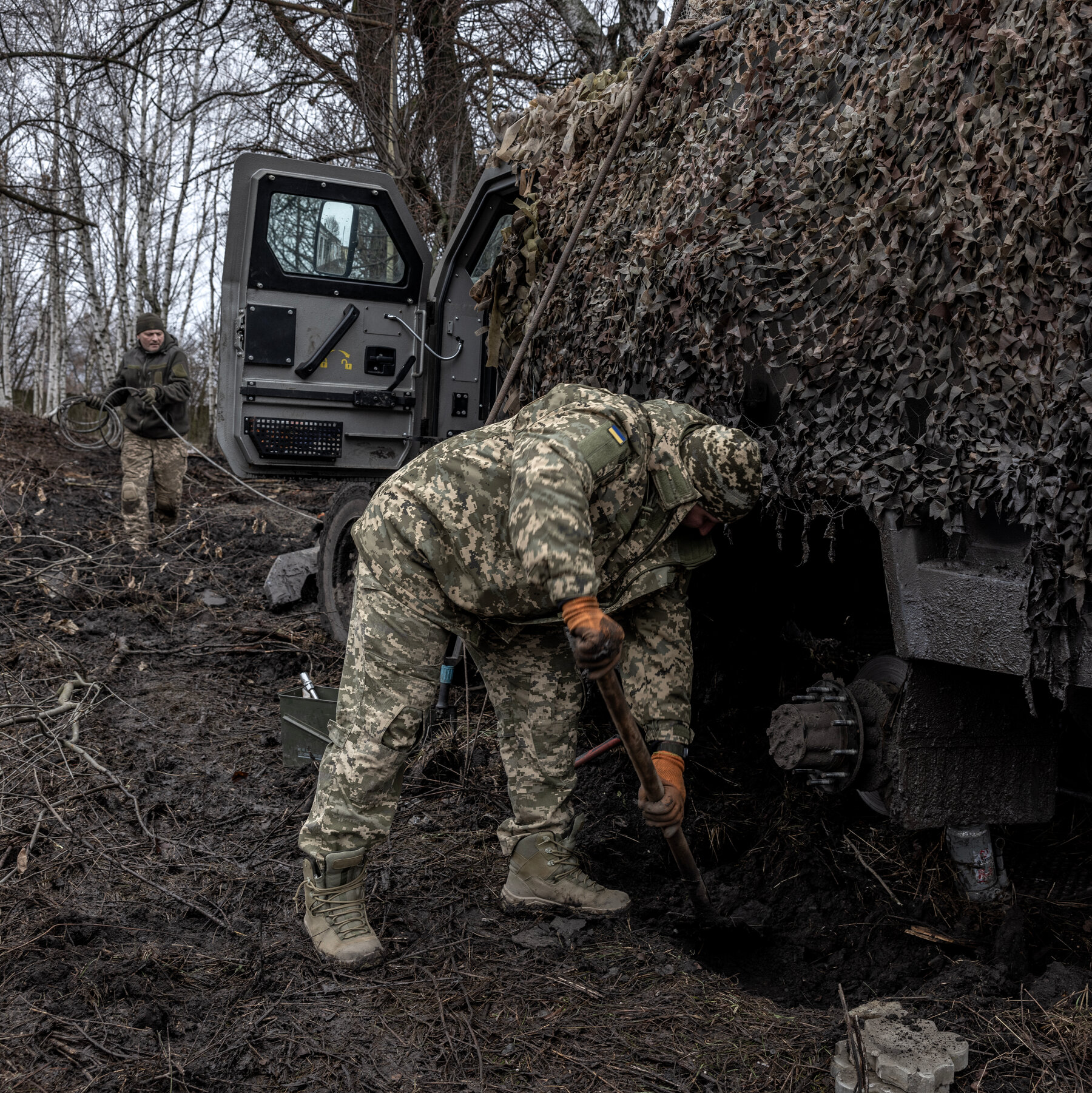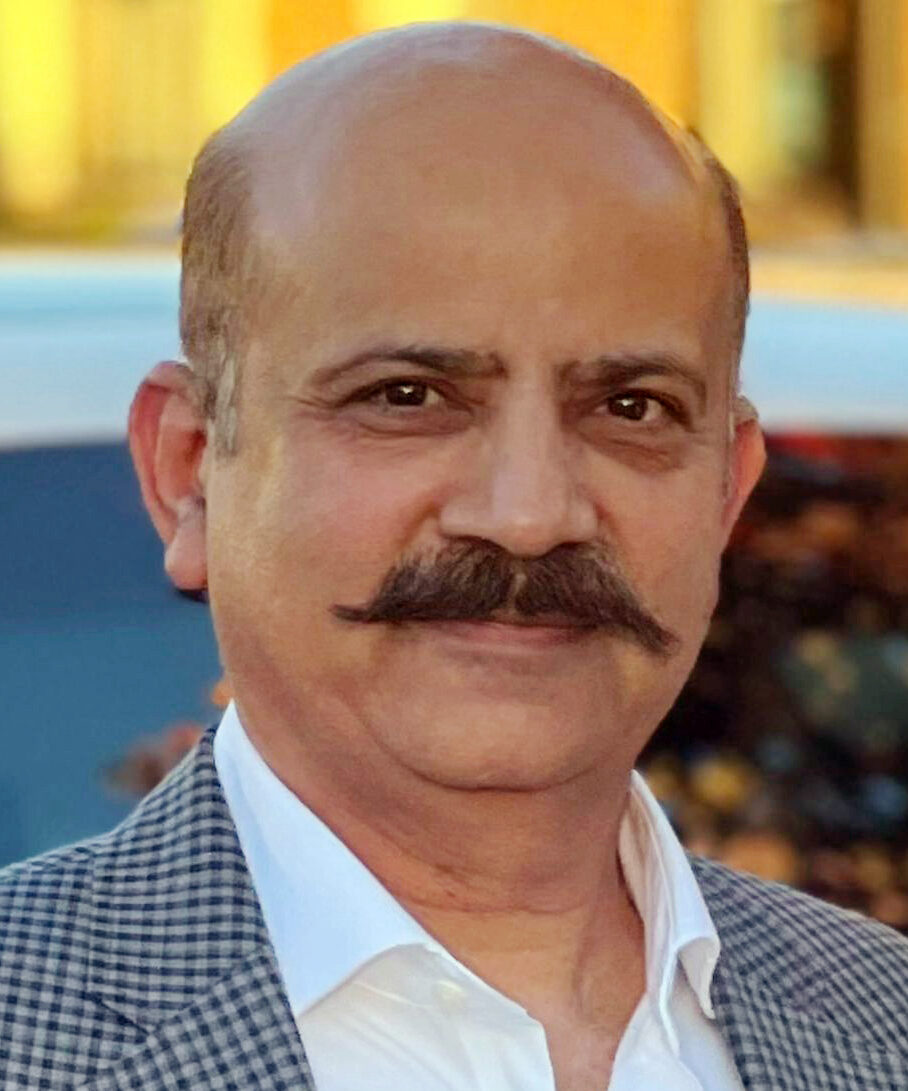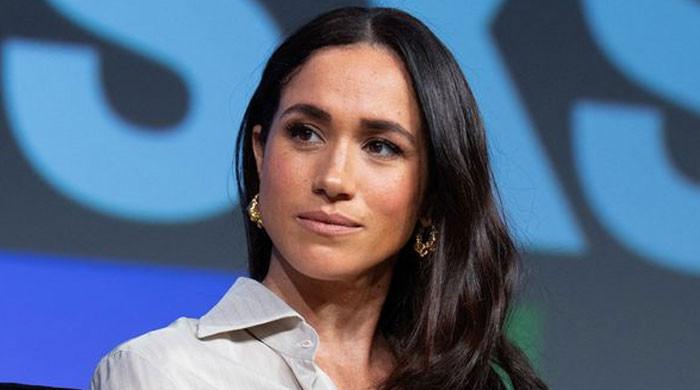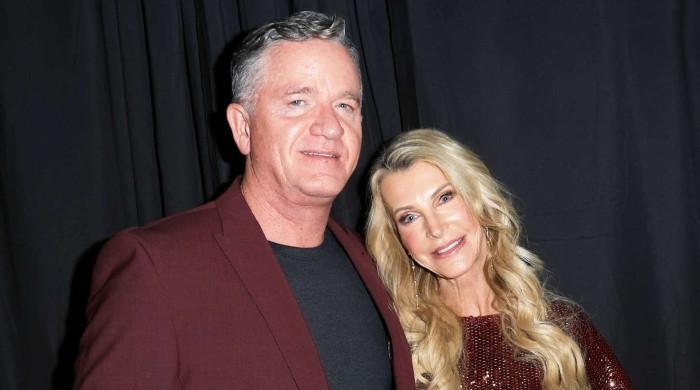Live Updates: European Allies Insist That U.S. Talks With Russia Include Ukraine

![]()
Ukraine’s Western allies on Thursday firmly rejected any peace talks with Moscow that did not include Kyiv, after President Trump’s conversation with President Vladimir V. Putin of Russia raised fears that the two leaders would attempt to sideline Ukrainian officials in a push to end the war.
Mr. Trump characterized a lengthy phone call with Mr. Putin on Wednesday as the start of negotiations, and the Kremlin said a meeting between the two leaders could be organized “fairly quickly.” But neither side mentioned any role for President Volodymyr Zelensky of Ukraine, adding to concerns that the Trump administration would soften U.S. support for Kyiv and push it to make concessions to Russia that Ukrainian officials have previously dismissed as unacceptable.
Defense Secretary Pete Hegseth, who on Wednesday said that Mr. Trump did not support Ukraine’s bid to join NATO as part of a peace plan, told reporters before a meeting of allied defense ministers on Thursday that the call with the Russian leader was “no betrayal” of Kyiv. Mr. Zelensky, for his part, sought to sound optimistic, saying overnight that he had spoken with Mr. Trump and believed “that America’s strength is sufficient to pressure Russia and Putin into peace, together with us, together with all our partners.”
At the NATO meeting in Brussels, Ukraine’s European allies insisted that Kyiv had their support and would need a seat at the table in any potential talks.
“It is crucial that Ukraine is closely involved in all talks on its future,” Mark Rutte, the NATO secretary general, said ahead of the meeting. John Healey, Britain’s defense secretary, said: “There can be no negotiation about Ukraine without Ukraine, and Ukraine’s voice must be at the heart of any talks.”
Here’s what else to know:
-
A win for Putin: The comments by Mr. Trump were the clearest sign yet that Mr. Putin, despite Russia’s disastrous failures at the outset of its full-scale military invasion of Ukraine in 2022, could still emerge from the war with a redrawn map of Europe. The Russian leader’s spokesman, Dmitri S. Peskov, said Mr. Putin had told Mr. Trump of “the need to eliminate the root causes of the conflict,” an indication the Russian leader would demand broader concessions from Ukraine and Western nations as part of any agreement to end the fighting.
-
Next steps: Mr. Trump said in remarks at the White House on Wednesday that reciprocal visits with Mr. Putin were likely and that Saudi Arabia might host the talks — without Mr. Zelensky. The Kremlin’s spokesman said Thursday that Russia believed a meeting between Mr. Putin and Mr. Trump should take place “fairly quickly,” but that it was too soon to discuss dates.
-
Zelensky’s tough spot: An apparent thaw in U.S.-Russian relations places the Ukrainian president in a daunting position. With the Trump administration appearing to demand concessions from Ukraine, including mineral rights, in exchange for continued U.S. support, analysts said that Mr. Zelensky has little choice but to go along with American-led talks despite his deep skepticism of Mr. Putin’s readiness to negotiate without imposing onerous conditions
-
Markets respond: Russian markets rallied on Thursday and the ruble soared to levels unseen for months after the call between the U.S. and Russian leaders, which made investors hopeful that some Western sanctions against Russia could be eased. China, the largest buyer of Russian oil and a key supplier of technology that Moscow can use on the battlefield, welcomed news that the two leaders had discussed an end to the fighting, according to the Chinese Foreign Ministry.
Trump’s envoy for Russia and Ukraine, Keith Kellogg, will travel to Germany and Ukraine in the coming days, according to the State Department. It said Kellogg would “engage with allies and partners across Europe who are willing to work with the United States to end Russia’s war against Ukraine.”
Image
Ukrainians on Thursday expressed a mixture of fear and hope over the prospect of a peace process with Russia, with some expressing disappointment in the United States for pursuing talks with Russia that did not, at least for now, include Ukraine.
After three years of grinding war, exhaustion has set in. Ukrainians are tired, but also aware of the price paid for defending their country — hundreds of thousands of people killed and wounded, towns and villages shattered, countless homes destroyed. While Ukrainians want the fighting to end, many said in interviews in the capital, Kyiv, that they want any peace to be just.
Particularly worrisome, to some, were the comments by Defense Secretary Pete Hegseth on Wednesday that it was “unrealistic” for Ukraine to expect a peace deal that would restore its borders to what they were in 2014, before Russia annexed Crimea. It was a clear signal from the Trump administration that it expected Ukraine to cede territory to Russia, possibly including lands that Moscow has seized since its full-scale invasion in 2022.
“The secretary of defense of the United States said yesterday we should not even dream of returning the occupied territories,” said Nikita Bezprozvannyi, 24, the director of an after-school program in Kyiv. “In my world — everyone I know, my friends and those fighting — we all do dream about it.”
Others were concerned that the sacrifices made by the Ukrainian military would be squandered.
Yaromyr Udod, 29, a project manager, said that in any peace talks, “Ukrainian sovereignty has to be respected,” and that he believed support from Kyiv’s allies was flagging.
“I feel that the level of commitment to supporting Ukraine has dropped,” he said, adding that he was upset with the United States in particular. “It is such a sharp change in the United States’ policy, and their rhetoric is very unpleasant,” he said.
On a foggy winter morning, the square in front of St. Michael’s Golden-Domed Monastery in the hilly center of Kyiv was filled with soldiers who had come to the cathedral for the funeral of yet another fallen comrade.
Observing the funeral was Oleksandr Liubun, 63, a retiree who often walks his dog there. He lives in Lukianivka, a district of the capital that is often attacked by the Russian military, and said he wanted the strikes to stop. “I am scared that the war might continue,” Mr. Liubun said, adding: “I want it to be finally over.”
Yulia Liubintsova, 41, the head of a ballet dancers union, expressed hope for peace negotiations, seeing talks as the only way for Ukraine to survive. “I understand that we will not return our territories as we have no people left to fight,” she said. “There are so much fewer of us, so much fewer, so only negotiations can help.”
Others said Ukraine should keep fighting instead of accepting an unfair peace. Tetyana Tkachenko, 34, a bank employee, said: “Even if missiles are falling on my head, I want to resist till the end. There has to be justice.”
Oleksandra Mykolyshyn and Nataliia Novosolova contributed reporting.
Mark Rutte, the NATO secretary general, just spoke alongside the Ukrainian defense minister, Rustem Umerov, as defense ministers meet in Brussels. American officials have spoken in recent days about the need for Europe to provide most of the support for Ukraine, but Umerov emphasized that all of the allies were still standing with his embattled nation. “The U.S. is with us, continuing security assistance,” he said. “We’re thankful for all the countries, for all the nations and leaderships, for their security assistance.”
Ukrainians in Kyiv are expressing a mixture of fear and hope over the prospect of a peace process with Russia. “I just want all this to be over, that’s the most important thing,” said Olena Markova, 38.
Image
Image
President Volodymyr Zelensky of Ukraine was already facing a daunting week as foreign officials gathered in Europe for talks about his country’s future.
The Trump administration was demanding $500 billion in Ukrainian mineral rights, it canceled Ukraine’s exemption from U.S. tariffs on steel, and a leading American skeptic of military assistance for Kyiv, Vice President JD Vance, was on his way to Europe for a meeting with the Ukrainian leader.
But on Wednesday, things went from bad to worse. Mr. Trump’s defense secretary delivered a harsh assessment of Ukraine’s prospects in its war with Russia. Then Mr. Trump announced that he had spoken with President Vladimir V. Putin of Russia, a call Mr. Trump characterized as the opening of talks to end the war — with no clear role for Mr. Zelensky.
The phone call also spelled the end of American efforts to isolate Russia diplomatically after its full-scale invasion of Ukraine nearly three years ago
“He’s on his heels geopolitically,” Cliff Kupchan, chairman of Eurasia Group, a risk analysis firm based in Washington, said of Mr. Zelensky.
Mr. Trump’s actions in the last two days — which also included a prisoner swap with the Kremlin that freed an American teacher — signaled a thawing relationship between the United States and Russia that could favor Mr. Putin in a peace deal while leaving Ukraine on the sidelines. Mr. Trump also called the Ukrainian leader on Wednesday, but in a social media post he did not mention how, or if, Mr. Zelensky would figure in peace talks.
Mr. Zelensky will meet with Mr. Vance and the secretary of state, Marco Rubio, at the annual Munich Security Conference, which opens on Friday, Mr. Trump said.
Negotiations to end the deadliest war in Europe in generations will shape the future of Ukraine, and the recent developments mean some of its territory likely to remain under Russian occupation.
And they will shape Mr. Zelensky’s political future. He has little choice but to go along with American-led talks despite his deep skepticism, shared by most Ukrainians, of Mr. Putin’s readiness to negotiate without imposing onerous conditions or bringing more military and economic pressure to bear.
By Thursday morning, it was a sentiment swirling widely in Kyiv, a city now hit nightly with Russian missiles and exploding drones.
Volodymyr Fesenko, a political analyst, wrote on Facebook that Mr. Putin was most likely playing the Trump administration for time. “He is not going to compromise on ending the war, as Trump’s team wants,” he wrote.
Image
Mr. Trump wasn’t the only one to deliver sobering news to Ukraine. The new U.S. secretary of defense, Pete Hegseth, told European allies on Wednesday that it was “unrealistic” for Ukraine to return to its borders as they were before Russia’s military invasion began in 2014.
And he added that the United States did not support Ukraine’s goal of joining NATO to secure any peace settlement, calling it “unrealistic.”
Mr. Zelensky has played weak hands well before. In the opening days of Russia’s invasion, he popped out of a bunker to film selfie videos that rallied his country, and much of the world, to Ukraine’s cause.
Now he is again facing a pivotal moment for his country in a diminished position, sinking in domestic polls and getting a cold shoulder from his most important ally.
There have been some bright spots for Ukraine. Soon after his inauguration, Mr. Trump criticized Mr. Putin harshly, saying he was “destroying” Russia with the war.
And while Mr. Trump’s claim on Ukraine’s minerals comes at a big cost for Kyiv, it has also been viewed by Ukrainian officials as a hopeful sign. The talks on mineral rights, which began on Wednesday with a visit to Kyiv by the American Treasury secretary, Scott Bessent, open a path for Mr. Trump to continue military aid while claiming to have secured a benefit for the United States.
Image
“They’ve essentially agreed to do that, so at least we don’t feel stupid,” Mr. Trump said of Ukraine’s willingness to yield its natural resources, in an interview with Fox News that aired on Monday. “Otherwise, we’re stupid. I said to them, ‘We have to get something. We cannot continue to pay this money.’ ”
That was before Russia and the United States showed a new willingness to work together. On Tuesday, Mr. Trump’s friend and envoy, Steve Witkoff, flew a private jet into Moscow to retrieve an imprisoned American teacher, Marc Fogel, a notable gesture of conciliation by Moscow. In return, the Kremlin said, the United States would deliver a Russian cybercriminal, Alexander Vinnik, back to Russia.
Mr. Zelensky has twice in recent days said he is willing to negotiate with Mr. Putin if Western allies offer security guarantees in a settlement.
Mr. Putin, for his part, has signaled that Mr. Zelensky would need to face an election at home before Russia would accept his signature on a peace deal. The demand suggests a Russian view of a potential three-step process for negotiating a settlement to the war, according to Ukrainian officials and security analysts. It envisions an initial truce followed by elections in Ukraine and only then a binding cease-fire.
Mr. Zelensky has rejected Mr. Putin’s repeated claims that he is an illegitimate leader, and that Ukraine needs to lift martial law and hold elections. (Ukrainian elections were delayed under martial law after Russia invaded in 2022. Mr. Zelensky’s five-year term, which would have expired last May, was extended under the law.)
Image
Ukrainian officials say they view the Russian demand for democratic elections as part of a ploy to destabilize the government and compel Ukraine to let its guard down for a vote. They have urged the Trump administration not to endorse the idea.
“It is the Russians who are raising the topic of elections because they need their man in Ukraine,” Mr. Zelensky said in an interview with the British broadcaster ITV News that aired last weekend. “If we suspend martial law, we may lose the army. And the Russians will be happy because the qualities of spirit and combat capability will be lost.”
Inside Ukraine, however, his domestic opponents are quietly preparing for a possible campaign.
Despite his diminished status going into talks, it is too early to write off Mr. Zelensky, a former actor and an adept leader in a crisis, Mr. Kupchan, the Eurasia analyst, said. “He’s proven to be quite a skilled counterpuncher,” he said. “I don’t feel we’re in the final act of any play yet.”
Mr. Zelensky is preparing for talks as the momentum on the main front of the war, in the Donbas region of eastern Ukraine, has favored Russia for more than a year. It is unclear for how long Russia can sustain extraordinarily high casualties, which have been estimated by military analysts as at least in the hundreds daily.
Image
And Ukraine is entering talks with one bit of leverage: its control over a few hundred square miles of Russian territory in the Kursk region captured last summer, an incursion that was deeply embarrassing to the Kremlin. Mr. Zelensky said he wants to trade territory in Kursk for Russian-held Ukrainian land, something Mr. Putin would almost certainly resist.
If the momentum of a few dozen or hundreds of yards of advances per day continued through negotiations, it would give an advantage to Moscow. Then, any delay by Ukraine in accepting cease-fire terms would cost Kyiv territory.
Russia’s progress has, though, slowed since November in month-on-month measures of captured territory, according to the Institute for the Study of War, a U.S.-based analytical group. In January, for example, Russia captured about 40 fewer square miles than in December, the institute reported. Military analysts have cautioned it is not possible to determine how significant that decline is.
Anton Troianovski contributed reporting.
Image
The U.S. defense secretary, Pete Hegseth, on Thursday defended President Trump’s conversation about Ukraine with President Vladimir V. Putin of Russia, saying it was “no betrayal” of Kyiv even though no representative of that country took part.
The call on Wednesday, which Mr. Trump characterized as the beginning of a negotiation to end the war in Ukraine, was the first known conversation between the Russian and American leaders since Mr. Trump returned to the White House last month. It has raised concerns among some European leaders that Ukraine could effectively be sidelined in any peace negotiations.
“There is no betrayal there,” said Mr. Hegseth, speaking as he arrived for a meeting of NATO defense ministers in Brussels. “There is a recognition that the whole world and the United States is invested and interested in peace, a negotiated peace.”
He said that only Mr. Trump, who held a separate call with Mr. Zelensky after he had spoken with Mr. Putin, was capable of convening the powers who could bring peace.
The call between Mr. Putin and Mr. Trump raised alarm in part because Ukrainian and European leaders have repeatedly insisted that there should be no talks on ending the war in Ukraine that do not involve Ukrainian representatives. Mark Rutte, the NATO secretary general, reiterated that position when he arrived at the meeting in Brussels, saying it was crucial that Ukraine be closely involved in all talks on its future.
Mr. Hegseth’s remarks came a day after he said that the United States did not support Ukraine’s desire to join NATO as part of a peace plan and that a return to Ukraine’s borders before 2014 — when Russia annexed Crimea — was “unrealistic.”
On Thursday, he repeated calls for NATO members to increase their military spending beyond 2 percent of gross domestic product and aim for 5 percent, — saying that Europe needs to step forward in leadership and in providing security guarantees.
But Mr. Hegseth also offered a robust defense of the NATO alliance and America’s role in it.
“America is right alongside our allies in NATO to ensure we remain strong and that this conflict comes to an end,” he said in Brussels.
That message is likely to reassure NATO countries, who were rattled when Mr. Trump said during his first term that the United States might withdraw from the alliance.
Image
When President Trump said on Wednesday that he might soon meet with his Russian counterpart, Vladimir Putin, to discuss an end to the nearly three-year war in Ukraine, he named what may have seemed like an unusual venue for the talks.
“We expect that he’ll come here, and I’ll go there and we’re going to meet also probably in Saudi Arabia the first time,” Mr. Trump told reporters in the Oval Office. “We’ll meet in Saudi Arabia, see if we can get something done.”
Mr. Trump cited both his and Mr. Putin’s relationship with Crown Prince Mohammed bin Salman, the de facto ruler of Saudi Arabia, as a reason for choosing the Gulf nation for their first meeting since he regained the White House. “We know the crown prince, and I think it’d be a very good place to be,” Mr. Trump said.
Saudi Arabia has increasingly played the role of mediator in the Russia-Ukraine war, along with its neighbor the United Arab Emirates.
For Prince Mohammed, mediating the war presents an opportunity to solidify his status as a global leader with influence that extends beyond the Middle East. It also enables him to position himself as a key intermediary capable of bringing powerful nations to the table, despite his continuing struggles to end Saudi Arabia’s involvement in the devastating war in Yemen.
In September 2022, Prince Mohammed helped to broker the release of 10 prisoners from various countries as part of a broader exchange process between Russia and Ukraine. Later, in May 2023, he invited Ukraine’s president, Volodymyr Zelensky, to speak at a gathering of Arab leaders in the Saudi city of Jeddah, where Mr. Zelensky called on Middle Eastern nations to support Ukraine against Russia.
Later that summer, Saudi Arabia and Ukraine jointly hosted closed-door talks in Jeddah aimed at ending the war, attended by diplomats from over 40 countries, though not from Russia.
In August 2024, Saudi Arabia played an influential role in negotiating the biggest U.S.-Russian prisoner swap since the Cold War, and Mr. Putin personally thanked the crown prince.
Earlier on Wednesday, Mr. Trump’s special envoy to the Middle East, Steve Witkoff, said that Prince Mohammed had played an “instrumental” role in mediating the release of Marc Fogel, an American teacher who was arrested on charges of bringing medical marijuana into Russia in August 2021.
“He has a very strong friendship with President Trump, and behind the scenes he was encouraging and pushing and looking for the right result, and it was helpful, it really was,” Mr. Witkoff said of the Saudi crown prince’s role.
Like many countries in the Middle East, Saudi Arabia has made it clear that it does not seek to take sides in the war. It has sent humanitarian aid to Ukraine even while cultivating close ties with Russia.
The Trump administration is also looking to the resource-rich Gulf nations, particularly Saudi Arabia and the United Arab Emirates, to play a postwar role in Gaza. Mr. Trump has been pushing a proposal to transfer all two million Palestinians out of the Gaza Strip and then rebuild the enclave as the “Riviera of the Middle East.”
Earlier this week, King Abdullah of Jordan said that there would be a meeting in Riyadh, the Saudi capital, involving Prince Mohammed and others to discuss Mr. Trump’s Gaza proposal before Arab leaders meet for an emergency Arab League summit in Cairo on Feb. 27.
The Kremlin’s spokesman said Russia believes a meeting between President Putin and President Trump should take place “fairly quickly,” but that it is too soon to talk about exact dates “because the work will only just begin” in the coming days. “The heads of state have a lot to talk about,” the spokesman, Dmitri S. Peskov, said.
News Analysis
Image
For President Vladimir V. Putin, one phone call marked a turning point as great as any battle in his three-year war.
In a lengthy call on Wednesday, President Trump delivered a message to Mr. Putin that encapsulated much of how the Russian leader sees today’s world: that Russia and the United States are two great nations that should negotiate Ukraine’s fate directly and move on to addressing even weightier global affairs.
It was the clearest sign yet that Mr. Putin, despite Russia’s disastrous failures at the outset of his Ukraine invasion in early 2022, could still emerge from the war with a redrawn map of Europe and an expansion of Russia’s influence in it.
The call came on the same day that Mr. Trump’s defense secretary, Pete Hegseth, declared that the United States would not support Ukraine’s desire for NATO membership. It also came as the Senate confirmed Tulsi Gabbard, widely seen as sympathetic to Mr. Putin, as the next director of national intelligence.
Taken together, the developments marked a payoff for Mr. Putin’s monthslong campaign of lavishing praise on Mr. Trump — apparently in the belief that the American president has the power to deliver a Russian victory in Ukraine.
“Putin is playing a very clever game,” Tatiana Stanovaya, a senior fellow at the Carnegie Russia Eurasia Center in Berlin, said. “He’s investing 100 percent into the effort to seduce Trump.”
In Moscow, news of the long-awaited call ushered in a wave of barely contained glee. Commentators claimed that the American-led three-year effort to isolate Russia had emphatically ended. They celebrated Mr. Trump’s glowing social media post after the call about “the Great History of Our Nations” and noted that the American president had spoken to Mr. Putin before he had called President Volodymyr Zelensky of Ukraine.
One Russian lawmaker said that Mr. Putin’s call with Mr. Trump “broke the West’s blockade.” Another said that Europeans were surely reading Mr. Trump’s post about it “with horror and cannot believe their eyes.” A third said it was a “day of good news.”
In a sign of the burst of optimism, Russia’s main stock market index jumped 5 percent on Thursday morning to its highest point since last summer, and its battered currency, the ruble, gained against the dollar to its strongest level since September.
Russian businesspeople hope that a peace deal with Mr. Trump could lead to sanctions against their country being dropped. The Kremlin said that, beyond Ukraine, Mr. Trump and Mr. Putin touched on “bilateral Russian-American relations in the economic sphere.”
Not all were happy. Some Russian cheerleaders of the war grumbled on social media that a deal with the United States could sell out the soldiers on the battlefield. A pro-war blog with more than a million followers, Two Majors, quoted a fighter who said that the discussion of Wednesday’s call “demoralizes and irritates me.”
Ms. Stanovaya and many other commentators noted that Mr. Putin’s chances of getting all he wants were far from assured. In particular, while Mr. Trump appears focused on ending the fighting in Ukraine, Mr. Putin wants a broader agreement with the United States that would push back NATO and allow Russia to reclaim a sphere of influence in Europe.
“Donald Trump spoke in favor of a speedy end to hostilities,” the Kremlin said in its summary of the call, hinting at that divergence. “Vladimir Putin, for his part, mentioned the need to eliminate the root causes of the conflict.”
The call sets up a complex negotiation whose contours — and participants — are still unclear. Mr. Zelensky will try to make the case for American support in a meeting with Secretary of State Marco Rubio and Vice President JD Vance in Munich on Friday.
Mr. Putin is likely to keep the military pressure on Ukraine while appealing to Mr. Trump’s ambitions as a peacemaker. Analysts say that what Mr. Putin cares about most is not how much territory he captures in Ukraine; rather, he wants a more comprehensive deal that keeps Ukraine out of NATO, limits the size of Ukraine’s military and reduces the Western alliance’s presence across Eastern and Central Europe.
Analysts doubt that Mr. Putin will agree to stop the fighting before he receives assurances that at least some of those wider demands will be met.
Ilya Grashchenkov, an analyst of Russian politics based in Moscow, said that the call with Mr. Trump made Mr. Putin’s repeated doubling down on the Ukraine war “look like a successful bet in a casino.”
Russia absorbed huge losses in Ukraine, gambling that, eventually, “the global paradigm would change” and the West would tire of supporting the country, Mr. Grashchenkov said in a phone interview. “This change has happened, and now it is unclear how this bet will play out in the future.”
Ivan Nechepurenko contributed reporting.
China, which has provided Russia with critical support for its war in Ukraine, said Thursday that it welcomed news that President Trump and President Putin had discussed an end to the fighting. Guo Jiakun, a spokesman for China’s foreign ministry, said China would continue to play a “constructive role” toward peace.
John Healey, Britain’s defense secretary, said as he entered the NATO meeting in Brussels that his country’s stance on Ukraine remained firm after President Trump spoke with President Putin about the war.
“My message in these discussions will be that there can be no negotiations about Ukraine without Ukraine,” Healey said. “And Ukraine’s voice must be at the heart of any talks.”
Video
transcript
transcript
-
We’ve seen the calls from President Trump overnight, and we all want to see a durable peace and no return to conflict and aggression. And let’s not forget, Russia remains a threat, well beyond Ukraine. So my message in these discussions will be that there can be no negotiation about Ukraine without Ukraine. And Ukraine’s voice must be at the heart of any talks.

![]()
Qasim Nauman
Mark Rutte, the NATO secretary general, has kicked off the meeting of defense ministers from the alliance. His brief opening remarks were public. After that, Rutte asked the news media to leave.
Image
It is crucial that Ukraine is closely involved in all talks about its future, Mark Rutte, the NATO secretary general, said Thursday. His comment comes a day after a call between President Trump and President Putin of Russia, which raised concerns that Ukraine could be sidelined in future negotiations about the war.
Defense Secretary Pete Hegseth, who is in Brussels for a meeting of NATO defense ministers, said the United States remained committed to the alliance. Russia’s invasion of Ukraine, however, showed that European countries had to increase defense spending beyond 2 percent of gross domestic product and aim for up to 5 percent, he said.
Video
transcript
transcript
-
The war in Ukraine, the aggression by Russia has been a factory reset for NATO. A realization that this alliance needs to be robust and strong and real, and that that’s why President Trump has called for increased defense spending across the board, for NATO, for European countries to recognize this is an urgent, real threat to the continent. This aggression needs to be a wake up call. Americans are an active part of this alliance, as we have been and will continue to.

Hegseth also defended President Trump’s call on Wednesday with President Vladimir V. Putin of Russia and said Trump was invested in a negotiated peace and “stopping the killing.” Asked whether the call sidelined Ukraine, given that its president was not included, Hegseth told reporters: “There is no betrayal there.”





